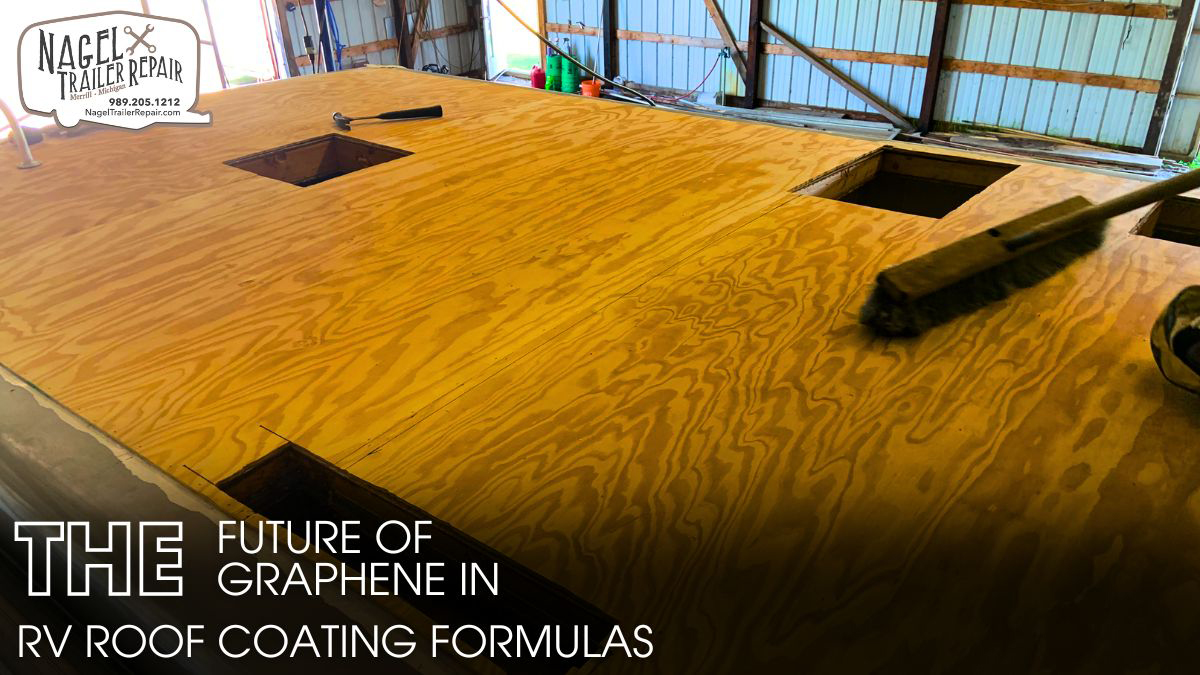For decades, RV owners have fought the same battle: keeping their roof sealed and weatherproof through years of travel and exposure. Whether made of rubber, fiberglass, or aluminum, every roof eventually develops cracks and leaks. Traditional coatings can slow that process, but they rarely stop it.
That’s why researchers and repair pros are now turning to something revolutionary: graphene. Across labs and RV service centers-in places such as Michigan, where seasonal extremes test every material-the conversation around RV roof repair is turning toward this ultra-strong, ultra-light material.
Graphene has become more than just a buzzword: it’s a one-atom-thick sheet of carbon, much stronger than steel but highly efficient in conducting heat and resistant to environmental wear. It is ideal for coating applications, mainly because RVs require a combination of flexibility, durability, and weather resistance.
Why Traditional Coatings Fail?
Roofs of RVs take a beating from weather conditions including UV rays, rain, snow, and temperature fluctuations upwards of 100° F in a given year. Yes, even the best sealants dry out, shrink, and crack over time, allowing water to seep through.
Anyone who has been regularly using RV roof leak repair Michigan knows that the problems can be relentless. Once water reaches the inside of the roof membrane, it can ruin insulation, framing, and sometimes even wiring-all costly repairs.
Traditional coatings simply can’t adapt to constant expansion and contraction. Graphene, however, offers a new layer of protection-literal and figurative. Its molecular lattice structure allows coatings to bend, flex, and seal tight; it reduces the risk of leaks dramatically, thereby extending the life of the roof.
How Graphene Strengthens Roof Coatings:
Graphene does not just sit on top of a surface; it reinforces the coating from within. When introduced into elastomeric or polyurethane formulas, it forms an internal shield that strengthens the bond between coating layers.
This means that
- Better adhesion on EPDM, TPO, and aluminum substrates.
- Better UV resistance, eliminating chalking and fading.
- Improved heat reflection keeps interiors cooler in summer.
- Longer service life, often doubling maintenance intervals.
Graphene coatings can provide camper roof resealing in Michigan with both peace of mind and practicality by minimizing routine upkeep, extending the coating’s life cycle, and providing a more stable surface resistant to freeze-thaw stress stemming from Michigan weather conditions.
Early Testing and Real-World Promise:
So far, testing has yielded remarkable results. Coatings embedded with graphene are showing increased elasticity and toughness, while still maintaining flexibility — a balance rarely achieved with traditional materials.
Manufacturers within the RV and marine industries have reported that graphene-enhanced coatings resist both cracking and corrosion even after very long UV exposure. Field applications by technicians in mobile RV roof replacement Michigan settings show that these coatings spread evenly, cure faster, and require less labor.
The environmental advantages are just as amazing. Graphene-based coatings can be waterborne, producing fewer harmful emissions and reducing overall maintenance waste. For those eco-conscious RV owners, that’s a major plus.
In a nutshell, graphene performs where conventional coatings ultimately fail: under long term stress and exposure.
What Graphene Means for RV Owners?
Graphene coatings are still emergent, but their trajectory is clear. With production costs dropping and awareness growing, they are sure to soon become a mainstream solution for high-end, long-term protection of RVs.
For RV owners, the advantages will likely comprise:
- Reduced maintenance cycles and fewer resealing jobs.
- Improved roofing durability in extreme weather conditions.
- Cooler roof surfaces that enhance comfort and energy efficiency.
- Improved protection from leakages and structural damage.
If you’re planning an upcoming RV Roof Repair Michigan service, it’s worth discussing graphene-based coatings with your technician, as in the long run, these value for money deals pay off despite their slightly higher cost upfront.
The Role of Professional Maintenance:
While revolutionary materials like graphene are just now beginning to transform coating technology, regular professional maintenance forms the backbone of long-term RV roof health. Skilled technicians can spot early warning signs-fine surface lines, minor seal fatigue, or hidden moisture intrusion-that owners might overlook.
These tiny defects, if left unnoticed, may ultimately cause microcrack propagation deep inside the aging roof layers, degrading the structure bit by bit. Routine inspections ensure that coatings retain elasticity, adhesion, and weather resistance, avoiding those microscopic fractures from spreading.
Moreover, maintenance professionals understand how to balance new innovations with proven repair practices to ensure that there is compatibility between the existing materials in your building and next-generation coatings. In other words, besides protecting your investment, professional upkeep lets new technologies reach their full potential, enabling a roof to last much longer than conventionally thought possible.
Conclusion:
The evolution of RV roof coatings has followed a similar pattern: patch, reseal, repeat. Graphene can finally break the cycle. With its extraordinary strength, flexibility, and resistance to environmental stress, it is one of the most promising advances in the RV world in decades.
For owners of Michigan RVs who experience everything from blistering sun to freezing snow and all points in between, graphene may soon become the gold standard in protection for your roof.
Whether routine maintenance or a full mobile RV roof replacement is at hand for Michigan, this technology certainly represents a move toward smarter, stronger, and more sustainable protection. Before you know it, “graphene” may not just be a scientific term; it will be a word associated with peace of mind whenever one hits the open road.

